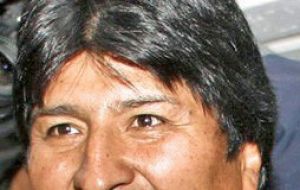MercoPress. South Atlantic News Agency
Morales “encouraged” with US attitude to Sunday's referendum
 Pte. Evo Morales
Pte. Evo Morales Bolivian president Evo Morales described as “encouraging” the congratulation message from President Barack Obama administration on Sunday's referendum for the approval of a new constitution, according to reports in the Cuban television.
"I feel that the message from the new United States government is encouraging and hopefully this message will enable respect for the people's sovereign decision and also enhance democracy, as we are doing in Bolivia", said Morales during a Round Table program aired on Tuesday from La Paz. Washington's first reactions to the referendum were expressed by Robert Wood, the State Department spokesperson, who congratulated the "Bolivian people for the referendum", adding that President Obama's administration is "looking forward to work with the Bolivian government" in ways that can lead to the "strengthening of democracy and prosperity in the hemisphere". "If that's the message I feel it's a message that is going to be respectful of the decisions of the Bolivian government, because before, with the government of Bush, we had many problems", underlined Morales. Wood said that the US government will wait until the final and definitive results are made public to state its position, but anticipated that a "democratic, free and fair process" contributes positively to democracy in Bolivia. Bolivia and the US under former president Bush rock-bottomed relations when President Morales closed down DEA's offices in La Paz and expelled the US ambassador Philip Goldberg, to which Washington reacted by reciprocating actions with the Bolivian ambassador Gustavo Guzmán and leaving Bolivia out of the tariff preference system which opens the US markets to those countries that collaborate in combating illegal drugs trade. "Since we expelled the US ambassador there have been no further coup attempts; Bolivia's reactionary right wing was severely weakened following the expulsion", added the Bolivian president. Morales said he was "very happy" with Sunday's victory which will enable the "re-foundation" of Bolivia. The new constitution benefits mostly the indigenous population, establishes tighter government control over the economy and natural resources, enables the re-election of President Morales and among other issues limits landholdings. Preliminary results indicate the constitution received between 58 and 60% approval, but four of the richest provinces (in farmland and natural resources) rejected it confirming that South America's landlocked and poorest country remains seriously divided. The first reaction from the Bolivian government was that the constitution applies to the whole territory and becomes effective next February. The equally strong opposition warned that the new constitution needs implementation bills and making effective the regional autonomy status promised when the discussions which helped reach a deal opening the way for the referendum. The situation has been described by Bolivian vice-president (and political scientist) Alvaro García Linera as the "catastrophic draw" since the chronic confrontation suffered by the country, seems to remain deadlocked.




Top Comments
Disclaimer & comment rulesCommenting for this story is now closed.
If you have a Facebook account, become a fan and comment on our Facebook Page!